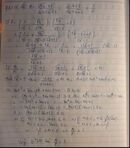Hãy nhập câu hỏi của bạn vào đây, nếu là tài khoản VIP, bạn sẽ được ưu tiên trả lời.

a, Thay x = - 1 vảo pt trên ta được : \(1-2\left(m+1\right)+m^2-3m=0\)
\(\Leftrightarrow m^2-3m-2m-2+1=0\Leftrightarrow m^2-5m-1=0\)
\(\Delta=25-4\left(-1\right)=29>0\)
\(m_1=\frac{5-\sqrt{29}}{2};m_2=\frac{5+\sqrt{29}}{2}\)
b, Để phương trình có 2 nghiệm phân biệt : \(\Delta'=\left(m+1\right)^2-\left(m^2-3m\right)=m^2+2m+1-m^2+3m=5m-1>0\Leftrightarrow m>\frac{1}{5}\)
c, Để phương trình có nghiệm duy nhất khi \(5m-1=0\Leftrightarrow m=\frac{1}{5}\)

a) 9x2 _ 6x + 1 =0 b) x2 -4x +4=25 c) (5 - 2x)2 -16 =0
<=>(3x-1)2 = 0 <=> x2 - 4x - 21 = 0 <=>(5-2x)2 - 42 =0
<=>x=1/3 <=> ( x - 7 ).(x + 3 )=0 <=> (5-2x-4).(5-2x+4) = o
<=> x=7 hoặc x= -3 <=> (1-2x).(9-2x)=0
<=> 1 - 2x = 0 hoặc 9 - 2x =0
<=> x = 1/2 hoặc x = 9/2

Gọi x1,x2x1,x2 là nghiệm của x2−mx−2=0(1)x2−mx−2=0(1)
→{x1+x2=mx1x2=−2→{x1+x2=mx1x2=−2
→⎧⎪ ⎪⎨⎪ ⎪⎩1x1+1x2=x1+x2x1x2=−m21x1.1x2=−12→{1x1+1x2=x1+x2x1x2=−m21x1.1x2=−12
→1x1,1x2→1x1,1x2 là nghiệm của phương trình
x2+m2x−12=0

\(A=\frac{2\sqrt{x}+1}{x+\sqrt{x}+1}\)với \(x=16\Rightarrow\sqrt{x}=4\)
\(=\frac{2.4+1}{16+4+1}=\frac{9}{21}=\frac{3}{7}\)
Vậy với x = 16 thì A nhận giá trị là 3/7
b, Sửa rút gọn biểu thức B nhé
Với \(x\ge0;x\ne1\)
\(B=\left(\frac{1}{\sqrt{x}-1}-\frac{\sqrt{x}}{1-x}\right):\left(\frac{\sqrt{x}}{\sqrt{x}-1}-1\right)\)
\(=\left(\frac{1}{\sqrt{x}-1}+\frac{\sqrt{x}}{\left(\sqrt{x}\pm1\right)}\right):\left(\frac{\sqrt{x}-\sqrt{x}+1}{\sqrt{x}-1}\right)\)
\(=\frac{\sqrt{x}+1+\sqrt{x}}{\left(\sqrt{x}\pm1\right)}.\frac{\sqrt{x}-1}{1}=\frac{2\sqrt{x}}{\sqrt{x}+1}\)
c, Ta có : \(M=\frac{A}{B}\)hay \(M=\frac{\frac{2\sqrt{x}+1}{x+\sqrt{x}+1}}{\frac{2\sqrt{x}}{\sqrt{x}+1}}\)
\(=\frac{2\sqrt{x}+1}{x+\sqrt{x}+1}.\frac{\sqrt{x}+1}{2\sqrt{x}}\)
\(=\frac{\left(2\sqrt{x}+1\right)\left(\sqrt{x}+1\right)}{2\sqrt{x}\left(x+\sqrt{x}+1\right)}\)

Bài 11:
Theo Vi-et, ta có: \(\left\{{}\begin{matrix}x_1+x_2=-\dfrac{b}{a}=5\\x_1x_2=\dfrac{c}{a}=4\end{matrix}\right.\)
\(y_1+y_2=\dfrac{1}{x_1}+\dfrac{1}{x_2}=\dfrac{x_1+x_2}{x_1x_2}=\dfrac{5}{4}\)
\(y_1\cdot y_2=\dfrac{1}{x_1}\cdot\dfrac{1}{x_2}=\dfrac{1}{x_1x_2}=\dfrac{1}{4}\)
Phương trình lập được sẽ là \(A^2-\dfrac{5}{4}A+\dfrac{1}{4}=0\)
Bài 10:
a: \(x_1+x_2=7+12=19;x_1x_2=7\cdot12=84\)
Phương trình lập được sẽ là \(x^2-19x+84=0\)
b: \(x_1+x_2=-2+5=3;x_1x_2=-2\cdot5=-10\)
Phương trình lập được sẽ là \(x^2-3x-10=0\)
c: \(x_1+x_2=-3+\left(-4\right)=-7;x_1x_2=\left(-3\right)\cdot\left(-4\right)=12\)
Phương trình lập được sẽ là \(x^2+7x+12=0\)